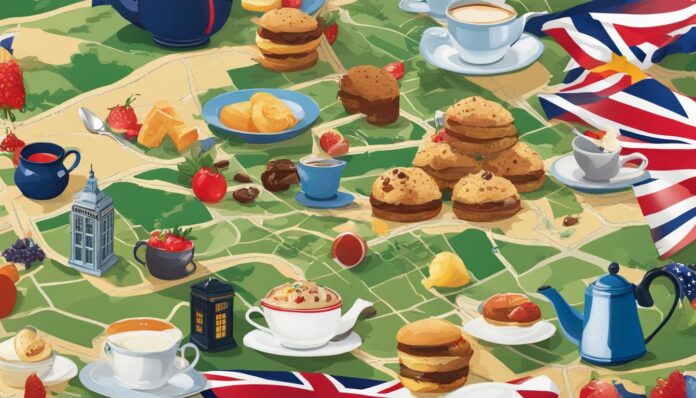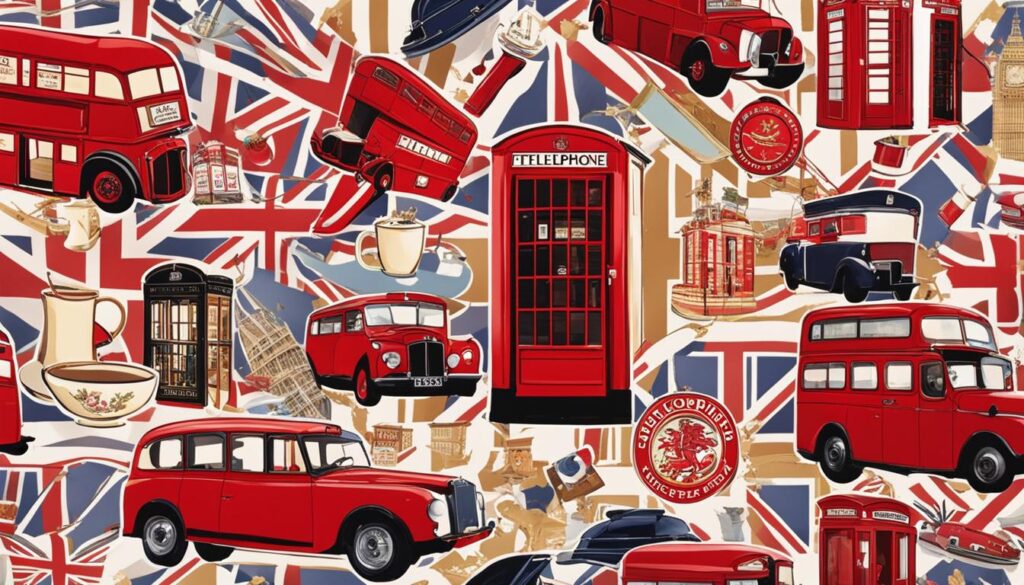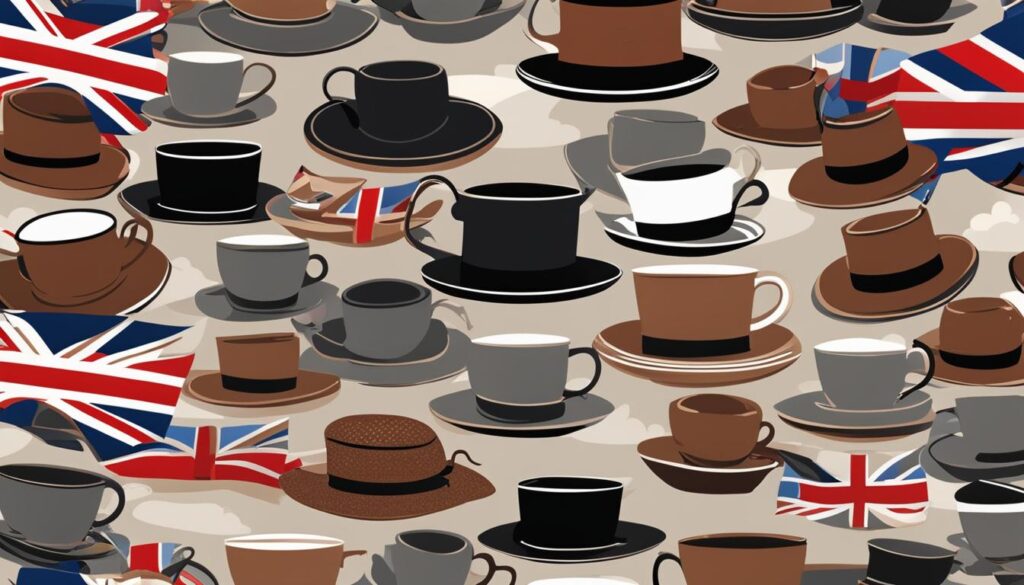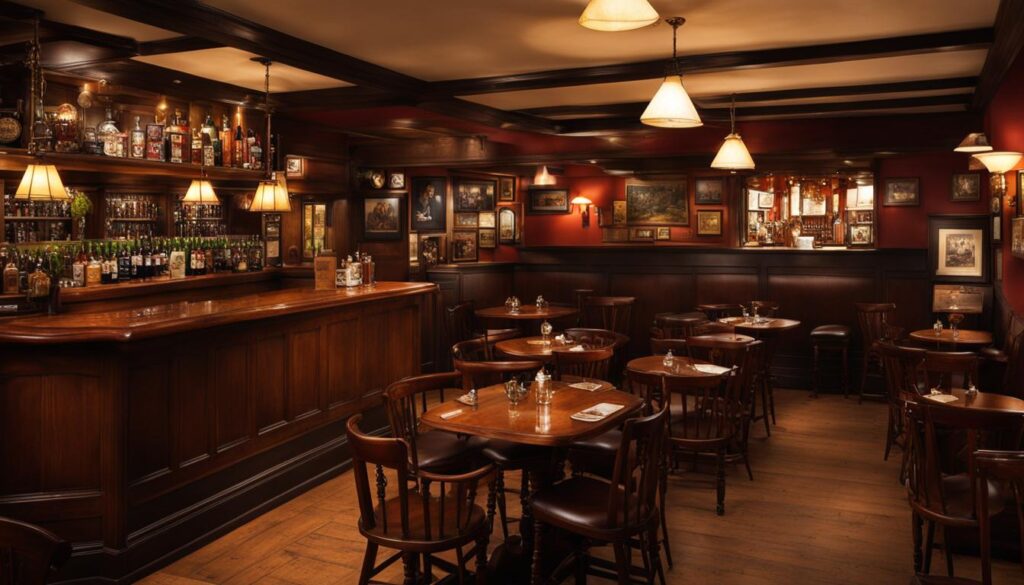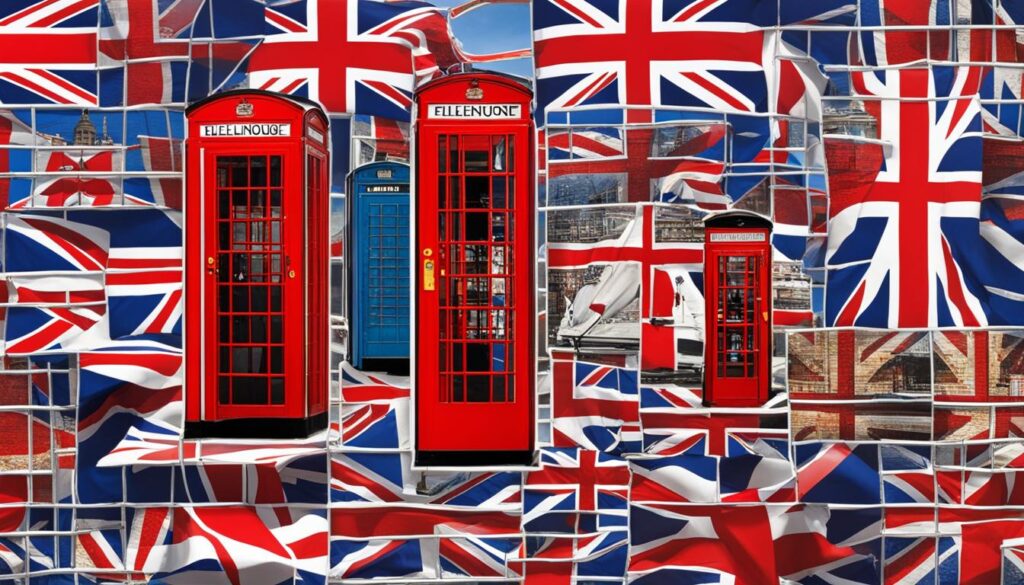Are you planning a trip to the UK? Or do you want to immerse yourself in British culture? Whatever the reason, understanding British phrases and idioms can make all the difference in your communication with locals. In this article, we will explore common British phrases that will help you understand and use them like a local.
British English has its own set of vocabulary, pronunciation, and idiomatic expressions that differ from American English. Before diving into the most common British phrases, it’s essential to familiarize yourself with British English to better grasp these popular phrases.
From greetings and salutations to food and drink terminology, transportation phrases to everyday British sayings and polite expressions, we will cover all the essential phrases to help you connect with locals and navigate social situations with ease.
So, what are some of the most common British phrases you should know? Let’s dive in and explore the fascinating world of British phrases and expressions.
Understanding British English
Before diving into the most common British phrases, it’s essential to familiarize yourself with British English. While it shares many similarities with American English, there are some differences you should be aware of. Understanding these differences will help you communicate more effectively with British speakers and avoid any potential confusion. Here are some essential British English phrases and slang you should know:
Pronunciation Differences
One of the most notable differences between American and British English is pronunciation. Here are some examples of words that are pronounced differently:
| American English | British English |
|---|---|
| Aluminum | Aluminium |
| Tomato | Tom-ah-to |
| Leisure | Lesh-ur |
| Garage | Gar-idge |
Essential British Slang
British slang can be challenging to understand, but it’s an integral part of the language. Here are some commonly used phrases:
- Bloody – An intensifier used to convey frustration or emphasis. Example: “That bloody train is always late.”
- Chuffed – Pleased or proud. Example: “I’m chuffed to bits with my new car.”
- Fancy – To be attracted to someone. Example: “Do you fancy going out for a drink later?”
- Gutted – Disappointed. Example: “I was gutted when I didn’t get the job.”
Idiomatic Expressions
British English also has its own set of idiomatic expressions that can be confusing for non-native speakers. Here are a few examples:
“Bob’s your uncle!” – This means “there you have it” or “everything is sorted.”
“Cheeky monkey” – This is used to describe someone who is being impudent or mischievous.
“It’s not my cup of tea” – This means that something is not to your liking or preference.
By familiarizing yourself with these essential British English phrases and slang, you’ll be well on your way to understanding and communicating like a true local.
Everyday British Sayings
Everyday British sayings are an essential part of British culture and conversations. Using these common expressions will make you sound like a true local. Let’s explore some of the most familiar British idioms.
Fancy a cuppa?
This popular British expression refers to a cup of tea, a staple in British culture. If someone asks if you fancy a cuppa, they are inviting you to join them for a cup of tea.
Bob’s your uncle
Bob’s your uncle is a fun and quirky British expression used to say that everything is all set and done. For example, if you’re asking for directions, and the helpful local gives you the route, they might end with the phrase “and Bob’s your uncle” meaning you’ve arrived at your destination.
Chin up
Chin up is a British expression used to encourage someone to keep their spirits up. It’s a way of saying “keep smiling” or “don’t give up.”
Easy peasy lemon squeezy
This expression is an example of British rhyming slang and is used to say that something is easy. For instance, if you’ve completed a task or solved a problem, you might say it was “easy peasy lemon squeezy.”
Fit as a fiddle
Fit as a fiddle is a British expression used to describe someone who is in excellent health and shape. If someone compliments you by saying you look fit as a fiddle, it means you look healthy and well.
Lost the plot
Lost the plot is a British expression used to describe someone who has lost track of what’s going on or someone who has become irrational or crazy.
Greetings and Salutations
As with any culture, greetings and salutations vary in the UK, but there are a few common phrases that you should know. These phrases will help you blend in and show that you understand the British way of life. Here are some essential common British phrases:
- Cheers – This is a casual way to say thank you or goodbye.
- Hiya – This is a shortened version of “hi” and is a common greeting in the UK.
- How do you do? – This is a formal way to greet someone and is often used in business settings or when meeting someone for the first time.
- Pleased to meet you – This is a polite way to greet someone when you first meet them.
- What’s up? – This is an informal way to ask someone how they are doing.
These common British phrases are a great starting point for when you first arrive in the UK, but don’t be afraid to ask locals for advice on when to use certain phrases. They will appreciate the effort you are making to fit in.
Polite Expressions
When interacting with locals in the UK, using the right polite expressions is crucial for showing respect and building rapport. Here are some of the most commonly used and popular British expressions:
“Please” and “thank you” – These two polite expressions are essential in British culture. Using them shows consideration and appreciation for others.
“Excuse me” – Use “excuse me” to get someone’s attention or to apologize for an interruption. It’s also a polite way to ask someone to repeat themselves if you didn’t hear them clearly.
“I’m sorry” – This phrase can be used to apologize for a mistake or inconvenience, even if it wasn’t your fault. It’s a polite way to show empathy and consideration for others.
“Pardon me” – Similar to “excuse me,” this phrase is used to politely ask someone to repeat themselves or to apologize for speaking out of turn.
Remember to use these expressions in the appropriate context and tone of voice to convey sincerity and politeness. For example, saying “please” with a smile and a friendly tone will go a long way in creating positive interactions with locals.
Using polite expressions is particularly important in formal situations, such as job interviews or business meetings. In these situations, it’s also important to use titles and last names when addressing someone, such as “Mr. Smith” or “Dr. Jones.”
By incorporating these polite expressions into your interactions with locals, you’ll show respect for British culture and create positive connections with those around you.
Weather Conversations
British people are known for their love of discussing the weather. Whether you’re walking down the street or grabbing a pint at the local pub, be prepared to engage in lighthearted weather conversations with the locals. Here are some common British phrases related to weather:
How’s the weather today?
Asking about the weather is a common icebreaker in the UK. You’ll often hear people ask “How’s the weather today?” or “Isn’t it a lovely day?” This shows that you’re interested in the current conditions and opens up the conversation to more topics.
The forecast says…
The weather forecast is frequently checked in the UK, and people like to keep up-to-date with the latest predictions. Use phrases like “The forecast says it’s going to rain later” or “I heard it’s going to be sunny tomorrow” to show you’re in the know.
It’s pouring down
When it’s raining heavily, Brits will often use the phrase “it’s pouring down” or “it’s absolutely chucking it down.” This is a common expression used to describe heavy rainfall.
It’s a bit nippy/cold
When the temperature drops, locals might use the phrases “it’s a bit nippy” or “it’s rather chilly.” These expressions are used to describe colder weather, and are often used in combination with others, such as “I need to put on another jumper.”
It’s a scorcher
When the sun is shining and the temperature is high, Brits might comment that “it’s a scorcher” or “it’s boiling hot.” These phrases are used to describe hot weather, and indicate that it’s a good time to enjoy the outdoors.
Food and Drink Terminology
British cuisine has a unique set of terms and names for various foods and drinks that may be unfamiliar to visitors. Familiarizing yourself with these common British phrases will go a long way when dining out in the UK.
| Phrase | Meaning |
|---|---|
| Bangers and Mash | A dish consisting of sausages and mashed potatoes |
| Cuppa | A cup of tea |
| Fry-up | A traditional cooked breakfast including bacon, eggs, and black pudding |
| Biscuit | A cookie |
| Chips | French fries |
| Crisps | Potato chips |
| Pudding | A dessert similar to a custard or cake |
| Scone | A small cake typically served with tea and jam |
| Pint | A unit of measurement for beer or cider, equivalent to 568 milliliters |
| Cider | An alcoholic drink made from fermented apples |
When ordering food or drink at a pub or restaurant, it’s common to use the phrase “please” to be polite. For example, you might say “Can I have a pint of beer, please?” or “Could I get the bangers and mash, please?”
Transportation Phrases
Getting around the UK can be confusing, especially if you’re unfamiliar with the local transportation system. However, learning a few common British phrases can make all the difference in helping you navigate and communicate your needs. Here are some everyday British sayings and phrases for transportation:
| Phrase | Meaning |
|---|---|
| Mind the gap | A warning to watch the space between the train and platform edge |
| Single/return | One-way ticket/round-trip ticket |
| Platform | The area where you wait for your train |
| Overground/Underground | Trains that run above or below ground, respectively |
| Peak/Off-Peak | Peak hours, when fares are more expensive, and off-peak hours, when fares are cheaper |
| Cab/Taxi | A car for hire with a driver |
| Busker | A street performer |
Using these phrases will help you get around with ease, whether you’re taking the tube, bus, or taxi. Don’t be afraid to ask for help if you’re unsure of where to go or what to say. Most people are happy to assist.
British Slang and Colloquialisms
Learning about British slang and colloquialisms is essential to understanding everyday conversations in the UK. While these phrases can be region-specific and constantly evolving, we’ve compiled a list of some widely known and commonly used ones to help you get started.
Top British Slang Terms:
| Slang Term | Definition |
|---|---|
| Bloke | A man |
| Bollocks | Rubbish or nonsense |
| Gutted | Extremely upset |
| Mate | Friend or buddy |
| Ta | Thank you |
These slang terms add a touch of informality and humor to conversations and are commonly used among friends and colleagues. However, it’s important to use them appropriately in different social contexts.
Common Colloquialisms:
- “Bob’s your uncle” – meaning “there you have it”
- “Chuffed to bits” – meaning “very pleased”
- “Getting on my wick” – meaning “getting on my nerves”
- “Lost the plot” – meaning “gone crazy”
- “In a pickle” – meaning “in a difficult situation”
Colloquialisms are informal expressions that add color and character to conversations, and they’re often region-specific. Understanding and using these expressions will help you blend in with the locals and communicate more effectively.
Expressions for Small Talk
Small talk is a great way to connect with people, and the British are no exception. Whether you’re waiting in line or chatting with coworkers, engaging in small talk can help break the ice and build rapport. Here are some popular British expressions for making the most of your small talk:
- “Lovely weather we’re having.” The weather is a classic topic for small talk, and the British love to comment on it. This expression is perfect for starting a conversation on a sunny day.
- “How about those [local sports team]?” Sports are a popular topic of conversation in the UK, and asking about the local team is a safe bet for starting a conversation.
- “Did you catch [popular TV show] last night?” Discussing the latest TV shows is a common way to bond with coworkers or acquaintances. Just make sure to avoid spoilers!
- “Have you been on any good holidays recently?” Travel is a popular topic in the UK, and mentioning your recent holidays or asking about someone else’s can lead to interesting conversations.
- “What do you like to do for fun?” Asking about hobbies and interests is a straightforward way to get to know someone and find common ground.
By using these everyday British sayings, you can participate in small talk with confidence and ease. So, the next time you find yourself in a social situation, remember to break the ice with a friendly conversation starter!
Conclusion
Now that you have learned about the most common British phrases and expressions, you are better equipped to communicate with native Brits and understand their unique culture. The British use these phrases every day, and by incorporating them into your language, you’ll blend in seamlessly.
Remember, it’s not just about the words you use, but also the tone and context in which you use them. Be mindful of the situation and the people you’re speaking with, and use these phrases accordingly.
Learning British English phrases can be a fun and rewarding experience, and it’s a great way to connect with people from different parts of the world. So, start practicing, and enjoy your journey into British dialects!




























